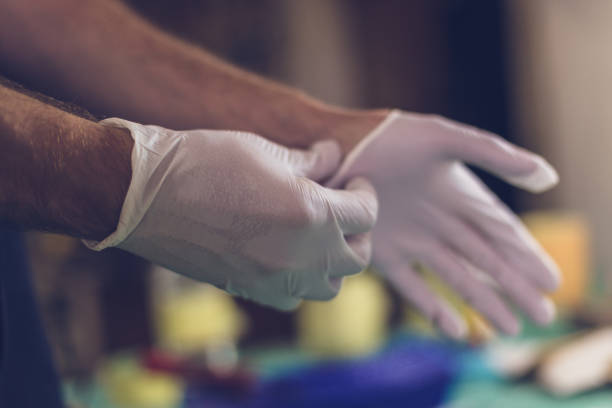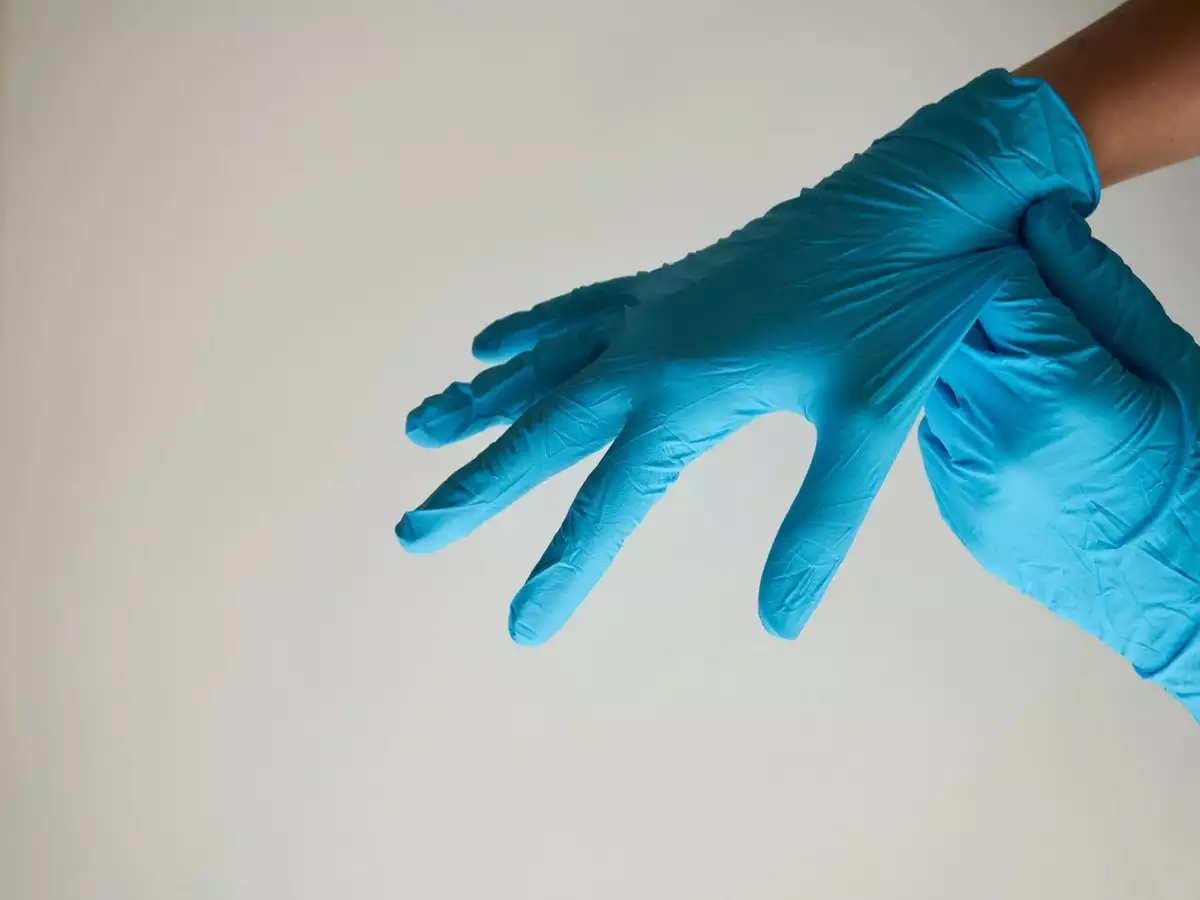Why should we wear disposable nitrile gloves, and what are they? Latex and vinyl gloves may be substituted with nitrile gloves. Disposable nitrile gloves are much superior to latex or vinyl in terms of reduced skin irritability and allergic response risk.
The best nitrile gloves can perform a variety of activities, from handling harmful chemicals in labs to making food in a restaurant kitchen, however, they cannot be used with all substances (due to the possibility of deterioration).

You may use this nitrile gloves Australia guide to determine if it’s time to stop using latex and vinyl gloves.
Describe the nitrile gloves
A synthetic form of the glove is nitrile disposable gloves. Acids, bases, and solvents are only a few of the typical lab substances that the rubber made of nitrile is resistant to. Nitrile gives strong tactile sensitivity and is also more resistant to punctures than latex.
The durability and chemical resistance of disposable nitrile gloves are much higher. In the 1990s, they rose to prominence as a latex substitute.
What is the Composition of Nitrile Gloves?
Disposable gloves made of nitrile are constructed of synthetic rubber. These sorts of gloves are made using the chemical compound “butyronitrile,” which is referred to as “nitrile” in the name.
What Is the Purpose of Nitrile?
The third-most significant commercial polymer is a synthetic substance called nitrile (nitriloin), which is generated from nitrate (behind polyethylene and styrene). NBR (nitrile butadiene rubber) is used in a broad variety of items, including gloves, sponges, foam, glues, sealants, shoes, and molded goods.
How Are Nitrile Gloves Made?

A mold is filled with materials that have been mixed together, injected into it, and then allowed to cure. A spinneret is used to extrude the nitrile glove components, creating long strands that are subsequently cut and shaped into gloves.
What Purposes Do Nitrile Gloves Serve?
Chemistry laboratories and other industrial settings often utilize nitrile gloves. They work well when handling harsh acids, bases, and several organic solvents. Because they are odor and stain-resistant, they are also often used in general food preparation.
Use of nitrile gloves: Why?
Nitrile gloves are used in chemistry laboratories, food manufacturing facilities, and other industrial settings because they provide stronger chemical resistance than natural latex rubber.
When Should You Wear Nitrile Gloves?
In chemistry laboratories and other industrial settings with chemical dangers, nitrile gloves are employed. They are useful for safeguarding your hands during food preparation from smells and stains. Nitrile gloves are used in chemistry laboratories because of the dry chemicals and corrosive acids present.
How Are Nitrile Gloves Used?

Nitrile gloves are preferred by healthcare professionals, medical professionals, physicians, surgeons, dentists, hair stylists, auto mechanics, cafeteria workers, tattoo artists, lab technicians, chemists, and scientists. Visit https://mercychildrensclinic.org/got-questions-on-nitrile-gloves/ to read about Got questions on nitrile gloves?
What Are the Protections of Nitrile Gloves?
Standard nitrile gloves are used in industry to protect workers from cuts, abrasions, and chemicals. Heat or electric shock are not protected by it. Additionally, it works well as a medical glove to prevent infections and bloodborne diseases.
What Advantages Do Nitrile Gloves Offer?
One key advantage is that they outperform latex gloves in terms of chemical and puncture resistance. To make it simpler to see punctures, they come in both black and blue hues. The degree of touch sensitivity has enhanced thanks to significant improvements in manufacturing. For the quantity of high-level protection supplied, this sort of PPE is disposable and reasonably priced.
Nitrile gloves provide the following advantages:
- High level of sensitivity
- Offers a great fit molding to the hand
- Mimics the fit and feel of latex gloves
- Ideal for use in high-risk situations where excellent barrier protection is required around infectious materials and hazardous chemicals
- Stronger than latex with more puncture resistance
- Latex-free, protein-free, and allergy-free
- dependable chemical defense and resistance
- Highly resistant to fats, oils, and petroleum-based products
- more comfortable and dexterous; durable and flexible with time
- Easy to use, lightweight, and breathable material
- Powdered and powder-free options are available.
- Long shelf life, buy nitrile gloves online for a better degree of protection, and wearable for longer periods of time
How to Use Nitrile Gloves Correctly
Nitrile gloves work best when they are rolled up over the fingers, shaped to fit the palm, and the extra material is rolled up to create a cuff. The result will be a fit that shields both hands. In order to protect your health and the environment, be sure you remove gloves properly.
Uses for Nitrile Gloves
In sectors such as food processing, food service, car repair, janitorial cleaning, chemistry laboratories, and other industrial settings where chemical dangers are prevalent, nitrile gloves are a common option. Hospitals, medical facilities, dentist offices, tattoo parlors, hair salons, medical spas, and nail salons may all make use of these medical gloves.
Do All Nitrile Gloves Meet Medical Standards?
Nitrile gloves are sometimes referred to as being of the “medical grade.” Before gloves are supplied to hospitals and other medical institutions, the Food and Drug Administration (FDA) performs a number of inspections to guarantee their durability.
In the food processing business, nitrile gloves are often not of medical quality. Only exam and surgical gloves are categorized as medical grade, which refers to the quality of the materials used.
What Makes Nitrile Gloves Different From Latex Gloves?
Latex gloves are made of natural rubber, whilst nitrile gloves are synthetic. Compared to natural rubber, nitrile medical gloves are more puncture-resistant (and a bit thicker). They also lack the latex that latex products include, which results in far fewer allergic responses.
Can I Use Nitrile Around Food?
Yes, they work well in applications requiring food-grade materials and are secure for use in food processing and packaging.
Do Nitrile Gloves Contain BPA?
Since nitrile gloves don’t contain any protein, they are deemed suitable for use in the food and beverage industries. This implies that latex-allergic individuals may use them without risk.
Concerning My Allergies
The protein present in latex gloves is absent in nitrile gloves. As a result, those who have a latex allergy may utilize them. Although nitrile gloves are latex-free, they do contain accelerator compounds that, in fewer than 1% of cases, induce a very minor allergic response.
Do Nitrile Gloves Contain Latex?
Chemically, nitrile and latex are not the same. It is latex-free since it lacks any protein. It could be a good idea to switch to nitrile even if you are not sensitive to latex. This will safeguard people who may have latex sensitivities.
Can You Have an Allergy to Powdered Nitrile Gloves?
Cornstarch makes up the powder within nitrile powdered gloves. If you find that your hands are becoming drier, the corn starch is probably to blame. Dry hands are often misdiagnosed as an allergy.
Can Disposable Nitrile Gloves Be Reused?
The FDA states that nitrile medical gloves cannot be used again. With continued usage, pinholes will appear in all gloves. It is strongly advised to throw away gloves after each usage. If you see a rip or tear, replace your gloves right away. Medical gloves shouldn’t be washed or sanitized either.
So, what exactly are nitrile gloves? a high standard of latex-free, chemical, and pathogenic body fluid-resistant hand protection. These gloves are ideal for you if you operate in hazardous material or infectious disease-filled environments. By clicking here you can also read about Coronavirus COVID-19 Information on Medical Gloves,
